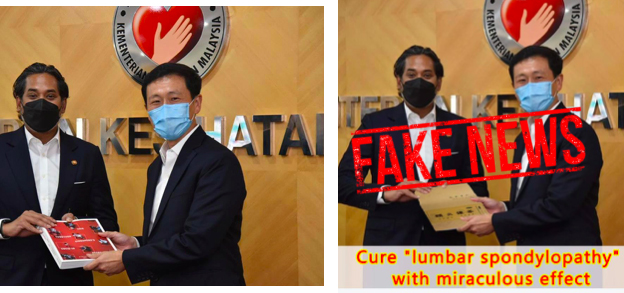Health Minister Ong Ye Kung has posted a warning on Facebook that doctored pictures of him are being used to endorse “certain medical products”.
Mr Ong said in his post on Tuesday (Apr 26) that it was members of the public who alerted him and the Ministry of Health about the doctored photo. “These are all fake,” he said in posts on Instagram and Facebook.


“As a practice, MOH officials and political appointees do not endorse any medical products,” Mr Ong said, adding that the ministry is working with Facebook in Singapore to remove the unauthorised and misleading posts.
“Please be careful and not fall prey to such fake advertising,” he urged.
One of the photos online shows Mr Ong with his Malaysian counterpart, Mr Khairy Jamaluddin, holding an envelope. The caption begins “Malaysian Orthopaedic Association” and appears to advertise a product that promises to cure “lumbar spondylopathy,” a form of arthritis, “with miraculous effect”.


The sponsored post appears on the Facebook page of TXSJW ⑦ pot, a store selling air fryers, which can no longer be accessed.
The image was taken from a March 23 Facebook post by Mr Ong, in which he and Mr Khairy Jamaluddin are pictured holding a book titled In This Together: Singapore’s Covid-19 Story.


The Health Minister is hardly the first official whose picture has been misused.
In August 2019, Deputy Prime Minister Heng Swee Keat announced that he filed a police report about his photo being misused to spread fake news.
On Facebook, Mr Heng included a sponsored post from an entity called ‘Well Vacation,’ which reportedly linked to an article titled “The Nation Says Goodbye To Finance….” The post included a photo of him speaking at the World Bank-Singapore Infrastructure Summit with the caption “You can take a HUGE advantage of this program”.


But a search on the wellvacation.com site shows nothing when “Heng Swee Keat” is keyed in. /TISG
Josephine Teo warns against fake news as her image and alleged comments were used in an online scam

